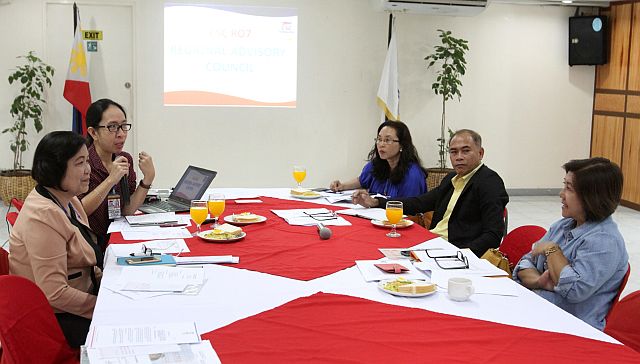Citizen’s Charter reviewed to hasten processes

Civil Service Commission in Central Visayas Director Editha D. Luzano (left) meets with Department of Trade and Industry Director Aster Caberte (right) and other government officials during the Regional Advisory Council (RAC) 3rd quarter meeting at the CSC office in Sudlon, Barangay Lahug, Cebu City. (CDN PHOTO/JUNJIE MENDOZA)
HEADS of government agencies including that of the Civil Service Commission are reviewing the Citizen’s Charter to find out if they can further streamline processes and requirements of government transactions.
The memorandum up for review was issued to government department heads last July 1, said Director Editha Luzano of the CSC in Central Visayas (CSC-7) in a press briefing yesterday.
Luzano, however, said she could not say how long the Citizen’s Charter review would be done.
The Citizen’s Charter is a transparency and accountability tool, a mechanism to ensure government services are responsive to the public’s needs. It is also a gauge of the agency’s performance and that of its employees.
Duterte’s first order as the newly sworn President of the Philippines was for all government agencies to streamline processes in all government agencies.
One of his campaign promises was that he would want to implement a 72-hour deadline for government transactions including the processing of clearances and business permits.
But, Luzano said, not all government transactions could be accomplished in 72 hours.
“Sometimes, a simple transaction takes five days (to process) while complex transactions can be done in 10 days,” she said.
She, however, said they would support President Duterte’s goal and implement whatever policies the head office would order them to carry out.
While they are reviewing the Citizen’s Charter, Luzano said that she was encouraging civil servants to follow the “No Lunch Break Policy” of the Anti-Red Tape Act of 2000 to ensure the continuous operation of government offices.
“They must be on the frontline and services should be rendered. There should be operations that will not be disrupted,” she added.
Disclaimer: The comments uploaded on this site do not necessarily represent or reflect the views of management and owner of Cebudailynews. We reserve the right to exclude comments that we deem to be inconsistent with our editorial standards.
